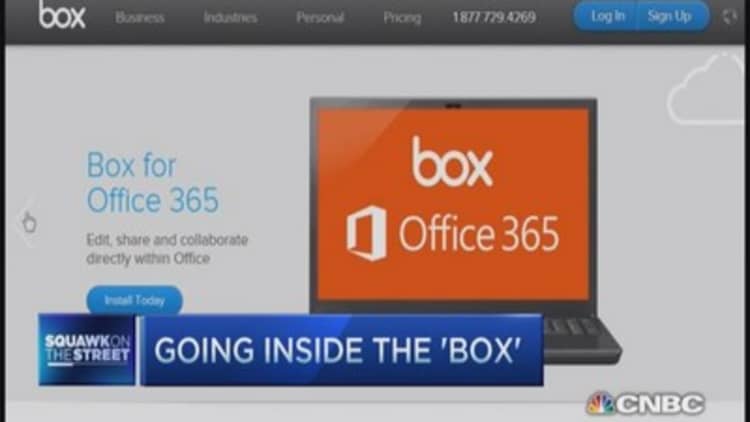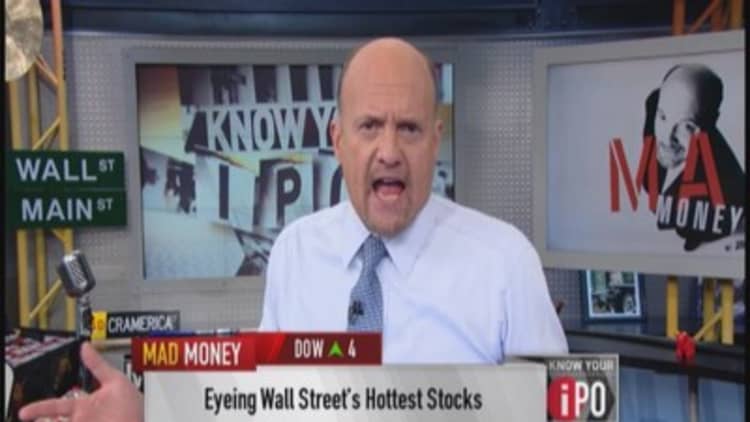
As Box's CEO Aaron Levie prepares to take his company public, he knows there are many rivals, public and private, gunning for his business.
That's because there's a lot of money at stake in the corporate cloud industry. Box targets segments of markets—including storage, file sharing and content collaboration—that are worth $23 billion and will reach an estimated $32 billion by 2018, according to research firm IDC.
Given such projected growth, it's no surprise that the competition is fierce.
"It is very competitive, especially as a lot of these larger companies like Microsoft, Google and EMC have recognized that opportunity," said Daniel Ives of FBR Capital Markets. "They have aggressively gone after it from a freemium model. And that's why, going forward, it will be increasingly competitive to gain share on this enterprise piece of the market."
So, who does Box—whose IPO prices after the closing bell Thursday—need to worry about in this space?
For one, Microsoft. The tech giant offers file storage as well as a product called SharePoint, which is a platform used by workers in many Fortune 500 companies allowing them to organize, manage and share content.
There's also EMC. It's product, Syncplicity, also offers a secure way for workers to store, sync and edit files. One key difference: EMC allows customers to store content in their own data centers, for security or compliance reasons, as well as in the cloud.
Read More Box loses money, and it doesn't matter—here's why
Not only are established companies moving into these markets, but so are private, venture-backed start-ups.
The most obvious example is Dropbox. The start-up, with a reported valuation of $10 billion, is developing a strong presence in the workplace. Its enterprise service is now used by 100,000 paying businesses including Spotify, Under Armor and News Corp.
"Now that Dropbox is parlaying its success in the consumer space into the enterprise space, the lines distinguishing Dropbox and Box are becoming more blurred," said Chandana Gopal, an analyst at IDC.

Beyond powerhouses like Dropbox, though, there are smaller start-ups as well.
For instance, San Francisco-based Huddle offers a platform allowing workers to store, share and collaborate on content. Part of its uniqueness is that it has carved out a solid presence in the public sector among government agencies such as NASA.
"Security is the number one issue for enterprise customers when it comes to how they share and collaborate on information," CEO Alastair Mitchell said. "At Huddle, we're seen as the leaders in that market."
The company has raised $86 million from investors including In-Q-Tel, the CIA's venture arm.
Still another start-up in Silicon Valley butting heads with Box is a company called Egnyte, which allows workers to access and share files on premises as well as in the cloud.
The benefit of such a hybrid product? Sometimes companies might have sensitive data that they don't want stored in the cloud, where the worry is that hackers can possibly gain access to it.
Egnyte, which has raised some $63 million from Kleiner Perkins and Google Ventures, serves 40,000 paying customers including Ikea, Home Depot and Coach.
Despite so many rivals, Box remains confident about its own strong competitive advantages. In particular, the company says its tools allowing workers to share files and folders in the cloud are the most secure and easy-to-use.
Read MoreHow Microsoft is aiming to catch up in cloud computing
A lot of companies agree. Box boasts 44,000 paying organizations, including a wide range of industries, from General Electric to Eli Lilly.
Now, as Box is poised to go public, investors will find out whether the company can keep winning more paying customers, and take market share from larger and smaller rivals.


